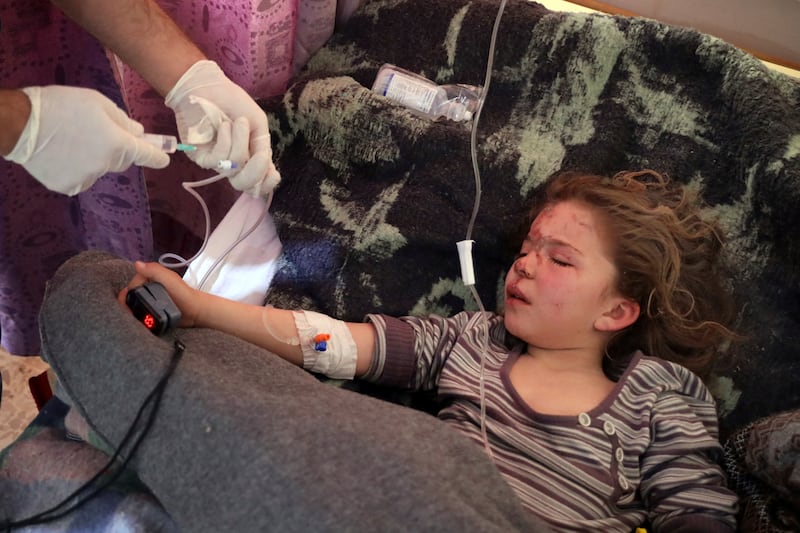As the death toll in the Turkey/Syria earthquake pushes past 36,000, miraculous rescue stories have emerged, including the one about the baby apparently born under the rubble and found still attached to her mom by her umbilical cord. Baby Aya, a name that means “miracle” or “sign from God,” is the sole survivor of her immediate family that, until last week, consisted of a mother, a father and four older siblings. As images emerged of her miraculous rescue and then of her bruised little face inside a hospital incubator for premature babies, people began asking the question: What happens to her now?
In Aya’s case, her great uncle will care for her, even though he himself is now homeless. He and his household of 11 people are living in a tent, he told The Associated Press, after their single-story home was destroyed in the earthquake that rocked Turkey and Syria. Nonfamily members have shown up at the hospital claiming to be family members, and on Monday night, one week after the quakes, gunmen showed up at the hospital where she is being cared for and beat up the hospital director. The director had fired a nurse he suspected of planning to kidnap Aya.
Meanwhile, thousands have posted on social media that they would be interested in adopting her, and some enterprising souls figured out how to get in touch with the hospital administrator where she is being cared for to again propose adoption. That’s not an option for baby Aya, nor is it an option for most (all?) of the newly orphaned children in Syria and Turkey.
So what is going to happen to “untold numbers” of children who no longer have living parents? Children are some of the most vulnerable in any crisis, whether that is humanmade or natural disasters. With the incredible devastation of last week’s earthquakes, there is no way to know exactly how many children are orphaned, how many have extended family and how many have been separated from immediate family.
A 6-month-old baby girl is at Adana City Hospital, but no one knows who she is or who her family might be. The tag on her bed in the intensive care unit says simply “Anonymous.” According to the BBC, she’s not the only one — many children have had their names “erased.” At the same time, desperate families are posting on social media details about where they lived, or that they are traveling between medical centers looking for their children.
Extended families are stepping up and taking in orphaned children, even when, like Aya’s great-uncle, they face their own dire circumstances. In Turkey, the government is appealing to people to apply to be foster families. Makeshift orphanages are being set up in hard-hit areas. It will take a significant amount of time to reunite families, where possible.
“Until the whereabouts of a child’s parent or other close family members can be verified, each separated child is considered to have living close relatives,” UNICEF emergency communication specialist Joe English told CNN. “Every effort should be made to reunify children with their families when suitable.”
Survivors face a long road ahead. The physical needs of food, clothing and shelter need to be met, and rebuilding will take a lot of time. The emotional needs of healing from such intense trauma and loss might take even longer. Cholera was detected in Syria last year, and the lack of proper sanitation in the destroyed areas makes it more likely to spread.
Sadly, in times of emergency and crisis, some of humanity’s worst try to take advantage of vulnerable children. Human traffickers showed up at border crossings in Poland during the early days of the Russian invasion last year, “volunteering” to get close to children. When I was there in early May, every rail station, bus station and emergency shelter that I visited had signs plastered everywhere warning refugees to be aware of danger signs, as well as emergency contact information.
Even though adoption is not an option to help the orphaned children in Turkey and Syria, there are other ways to help. Organizations on the ground right now need financial donations to help pay for professional emergency responders and big equipment. Scammers are already profiting from people’s generosity, so it’s important to donate to known organizations. The Federal Trade Commission has created a consumer alert warning potential donors to watch for names that are close to real charities and to beware of campaigns that ask you to donate with cash, by gift card or cryptocurrency. They’ve also given the following guidelines: slow down, do your homework by checking charity watchdog groups, like Charity Navigator and CharityWatch; look at fees and timing and educate yourself on scams, like the ones currently circulating on TikTok with altered images or brand-new social media accounts.
Reliable aid organizations with boots on the ground in Turkey and, where possible, in Syria include the following: Latter-day Saint Charities, Save the Children, International Organization for Migration, UNICEF, Doctors Without Borders, World Central Kitchen, the International Rescue Committee and Islamic Relief USA. At least two organizations in Utah are also raising funds and looking to provide assistance: Lifting Hands International and Hope Humanitarian.


